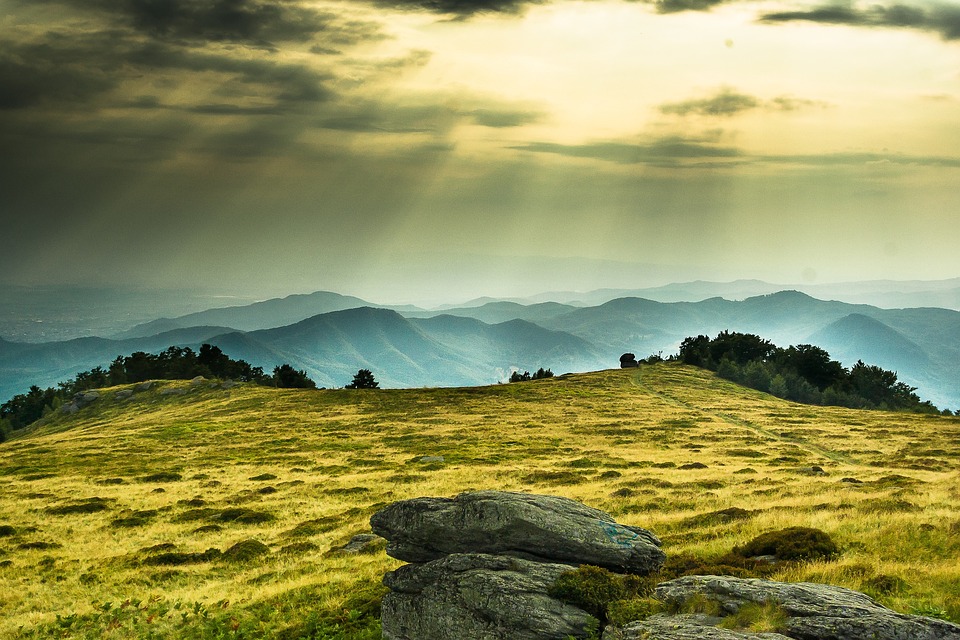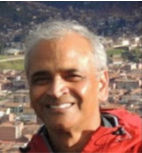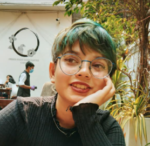Translated from the Bengali by Chirayata Chakrabarty

Image used for representation.
1.
Late Train
A couple of fragmented red-orange clouds glided against the vast expanse of the sky. The vague glow of the late afternoon light silhouetting the clouds streamed into our train, filling it with a sort of melancholy locomotive fervor. The cerulean outlines of the mountains were visible from the window, like uneven conical edifices in the distance, illuminated beneath the clouds by the descending light. In the rhythmic rattling of the wheels’ quick friction in between the two rims of the rail line, the minds of all the passengers became one with the stillness of the hills and the intangibility of the clouds, in a stroke of inexplicable angst. It will probably be a few more hours before I reach Tura. Two long-distance trains were making their way toward the mountains, on two parallel lines. They shouldn’t be going the same way, at the same time. But today, one of them was late. There aren’t any trains scheduled to go the opposite way, so they were using both rails. They looked as if they were racing against each other, competing to see who outdoes whom. The administrators, though, wanted the late train to go ahead.
The late train was going ahead, but it seemed as if the second train was not willing to allow the first its taste of the winning position. It rapidly hurtled into every station. The other was about to leave. I was on the second train, seated at the window of this grimy, crammed, and an overflowing carriage full of people escaping the undue thronging of the capital. After a few stations, even I became anxious to catch up with the first train, like the others. Yet every time we did catch up, it left us behind. This game of hide and seek had gotten all of us completely enthralled. That’s when I saw her. In the last carriage of the first train was a woman, perhaps aged around twenty-five or thirty. Leaning her elbow against the edge of the open window, she rested her face on her palm. She did not notice our train, even though it was in the line of her sight. The first time I saw her face, it dissolved with the velocity of the train within a fraction of a second, before it could have imprinted itself deeply into my brain. I strained to remember those eyes that had fleetingly met the field of my view.
I wouldn’t say the sight of that face frenzied me. I can’t say why the afterglow from the shadows and lights of the abandoned evening had made me so very morose, but I had only seen her in a rather preoccupied manner, her presence remaining in one corner of my eyes, disregarded. In the next station, when she reappeared, I became aware of the way her hand held her cheek. I bought a sugary, milky cup of tea from the vendor and sipped it, but again her face disappeared with the gaining speed of the train before I could have discerned it properly. The rapidly shifting frames of the windows reverberated against each other. The lights in the carriage turned on, the night wind brought the late autumn chill from the mountains, and I pushed the glass windowpane down. Now every passenger in every little frame could see themselves along with the inside of the other carriage, in every window of both trains, the two realities fading into each other. Perhaps my before unnoticed gaze had startled her. The third time, she saw me, and the fourth time I realized, even though she did not meet my eyes directly, she had waited for my train to catch up to hers. Our windows met each other in the dimness of the dusk, and for a moment, so did her eyes, mine. Before she disappeared again, I saw my reflection in her window beside her own figure, only for a second. I saw the woman at almost every stop. I thought I saw her smile once, or maybe it was just her bright eyes that smiled, or maybe she had taken her hand off her cheek so that I would see her entire face. I don’t remember all the details now. All I remember is how intelligent her face had looked. I felt as if I knew it somehow as if an episode from some lost memory was trying to reveal itself but couldn’t.
The two trains crossed the bridge over the Simsang river almost concurrently. The angular iron trusses rushed backward blindingly, and all the air driven forward by the train created a mesmerizing periodic sound. The Simsang river lies underneath, black in the gloom of the night, its pebble-beaten stream flowing towards the capital in the south, from the hills in the north; afar, on both banks of the river, sleepy lights hinted at the existence of villages. Our trains kept up with each other and, as we crossed the trusses, I looked for the girl in vain. After we crossed Simsang, the late train swept by us, and we did not see it again.
I meet a lot of people’s eyes every day without recalling their faces later. In the swarm of memories of people, the fragmented moments of eye contact from that evening had dissolved into the jumbled list of a hundred other encounters. Yet, even after years, this one tiny bit of the list had remained in some distant edge of my brain—by some infinitesimal, not immediately seen connection—which waited for a familiar sign to awaken a slumbering memory from the past.
2.
At The Mountains Of Tura
Two years later, on another late autumn afternoon, I set up camp in Tura, on the edge of a deep lake. It had taken me two whole days, after a steep serpentine hike across a deserted pass in the mountains, to reach the site from Tura. I set up a tent in the nearest valley on the first night, under the open sky. The next day, following the multiple descents of the sloping road, I entered a small trench. Within it was a rolling river that flowed into a cool, green-blue lake. The lake was called Rongkosha. I had left behind many similar lakes. Now, at the closing of a tiring day, my tent sat on a big rock near a calm body of water. I had taken my shoes off and dipped my dog-tired feet into the cold water. Flooding the three-dimensional structures of all the hills around me with a red glow, the sun was getting ready to set. I could see the snow resting in the crevices at the higher peaks. I lit a fire in my small stove in preparation for dinner. The absence of the sun re-awakened the chill in the air. I put on my jacket.
In the darkness of the night, I could see another campfire on the other bank across the lake. Bits and pieces of conversation floated over the water and came to me. The voice of a woman and of a man. Faint sounds of laughter. Two days of solitude had made me yearn for human contact again, but I knew I shouldn’t disturb my neighbors. Like me, they too were in this calm, isolated corner, far from humanity, to be away from people, to exist completely among the mountains and nature.
I remember how a waning moon rose around midnight, soaking the entire firmament with light, and from it, creating incredible shadows from the mountains and rocks—its reflection glistening in the lake. Its light made the borders of my shadow clean and distinct. Yet, it could not make the Jupiter, Sirius, and the Orion constellation meet. In fact, the glow of the galaxy shimmered in the south that night. I did not light the fire. Instead, I sat on a rock, longing to hear the tor—the footsteps of deer, bears, and wild cats, the echoes of nature. But all the beasts were far away from me that night. Only the sound of the trees swaying in the wind greeted me. The wind rolled down the frame of the hills from the south, and unsettling the pine trees behind me, dissolved into the trenches up north, bringing me shivers from the waves of the lake. My tent was trying to fly away from me and into the tranquil sky. I climbed into it, pinning it to the ground.
The thin air of the altitude and my tired body were making it difficult to sleep. I checked my watch every hour. The world outside my tent was serene. I saw a myriad of dreams, of strange, unsettling, supernatural occurrences, dreams uncharacteristic of my picturesque environment. By the time I woke up, the sun had flooded the western ranges with its yellow hue.
My neighbors from the other end of the lake were gone. There was only one way into the deeper recesses of the range—the Rumaru trench. It should take them a whole day to cross it. I wanted to let them have their solitude, so I did not rush to take my tent down. I made myself some coffee on the stove and spent the rest of the morning idling on the rock. I took a short dip in the cool water of the lake, and then, laying out a rug, stared at the white clouds’ calm surfing in the blue, blue sky, peeking through the leaves of the tall pine. The people who lived at the foot of the hills in northern Tura had said to me, to understand nature, we must know how to read the language of the clouds. I wanted to read the language of the clouds on that lazy afternoon, trying to understand if they would bring another storm in the evening. The storm did not come, and the next day, I took my tent and made my way down the Rumaru trench.
The path descended quite quickly. The water from the lake accompanied me, sometimes as a waterfall, sometimes as a hurried river, and sometimes as a calm stream of water. Next to them, certain nameless red and blue flowers swayed in the breeze. The further I climbed down the trench, the taller the peaks looked. Thousands of years ago, as the earth got warmer, glaciers had receded down this path. They had left their marks on the stone, gifting this trench with its geometric layers. Before I could even reach the bottom, again I came across the couple I had so tried to avoid. They had set up their tent right by the path, a young man and woman. The way it always pans out, after an exchange of words, they asked me to sit with them. We chatted about this and that, about all the available passageways, passes that were hard to traverse, places you would not find drinkable water in, etc. I was tired after the five-hour walk, so when they invited me for tea, I could not say no.
The man’s name was Prantik, and the woman with him was Shefalika. Prantik very quickly boiled water with tea leaves on the stove, and then, after mixing some milk powder into it, poured it into my big tin cup. Prantik and Shefalika sat next to each other on the body of a fallen tree, and I sat a foot away on a rock.
Shefalika sipped her tea and immediately exclaimed, “I hope the tea is alright to drink!” The tea, mixed with milk and sugar, instantly relieved me of all fatigue, as if my mind were suddenly laid on a soft bed and a long-forgotten memory was brought back to me. I looked up at her, and without any doubt, I knew that I had seen her from my window, that evening two years ago, on that train. Within the memory entwined with a sip of the tea, that evening was a woman’s face. Deep within a dark alcove of my brain, a team of neurons had crafted this ball of memory, which merely waited to taste this milky, sugary tea. Its taste, by some subliminal means, had projected Shefalika’s face onto my consciousness, after all these years.
But I did not have anything to say to her that evening. I’d seen her in some train window two years ago, it’s hard to believe such claims. It would have only made me look awkward. The fact that she did not remember me, my face, was clear to me from the beginning. Besides, why would she? In fact, if I had not taken a sip from that tea, I would not have remembered her either. So, I did not stay for much longer after the tea. I told them I had to reach the bottom of the trench by evening, I had to cross almost three other passes and exit the hills before then.
Before I left, Prantik showed me a map. There was an old path right next to where they had set up their tent which hikers like us did not use anymore. The map seemed ancient. A path made up of little lines stopped at a circle.
Prantik asked, “Do you know about this route? Can you tell us what this circle is?”
I used to think I knew the highlands of Tura like the back of my hand, but this little path was completely new to me. Prantik said, “Did you know that at some point actual lava used to flow through a part of these mountains?”
“Of course,” I said, “there is a lot of basalt right here next to this path, they are all remains of lava.”
“No, I’m not talking about that long ago, I’m talking about the last century, not old, solidified lava, I’m talking about an active lava pool, which connects to a magma chamber, right under our feet.”
I couldn’t believe him. “Red, hot, molten lava? It doesn’t make any sense. And if we did have magma this close to the ground, won’t there be more lava branching out at the top? Wouldn’t we know by now?”
“You know how protective the people here are about the Tura range. No institution has been able to make a map of the place in the last fifty years. In the last ten years, I’ve tried to acquire all the pictures taken of this area by every artificial satellite, but I haven’t found any. Shefalika believes she had seen a lava pool here, but she doesn’t remember when or where,” Prantik said.
So, Shefalika was the one who told him about the lava pool. I’d heard about it many years ago, about a lava pool somewhere in the mountains in Tura. The word went around in the circle of the usual mountain climbers. I had brushed it off as a rumor and eventually, it died a natural death. Looking at Prantik’s map, I realized that it would take about two days to reach the sketched circle by foot. I could sense that they wanted me to go with them, but I couldn’t because I didn’t have enough food on me. Moreover, autumn was about to end, and a huge snowstorm was coming soon after.
Shefalika and I did not speak to each other after all. I couldn’t even look at her properly. That evening on the train kept coming back to me. I bid my adieu and began to climb down the trench again. I was assured they would not find the lava pool. I hadn’t heard of a volcano or hot lava erupting around here in the last thousand years. Even though tectonically this area was very active, that would be at least twenty kilometers below ground. Would the current of lava be that deep to be able to climb up here? Why was Shefalika so sure about it?
Was it really Shefalika I’d seen in the half-darkness on that train? A long time ago, Marcel Proust had written about how when nothing remains of our abysmal memory, when we slowly lose all the people familiar to us, when all the material objects we use every day turn to dust, disperse, never to be found again, it is then that our senses of taste and smell, that usually seem very weak, fragile, still endure in the deepest corners of our minds; like some immortal soul, they sit in the ruins of all memory and hold onto a fine thread of the past. For whatever reason, that memory of Shefalika hid beneath the experience of drinking that rail-station tea. If I hadn’t taken a sip of the tea today or tasted or smelt it, I would not have remembered her.
To be continued…
To read the following episode, click on the link below:
Dita’s Watch, the fully translated novel, will soon be available for purchase on our amazon bookstore.
Also, read a Bengali fiction by Swapnamoy Chakraborty, translated into English by Nandini Gupta, and published in The Antonym:
Follow The Antonym’s Facebook page and Instagram account for more content and exciting updates.



























0 Comments